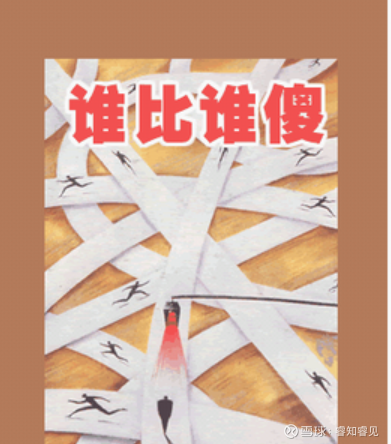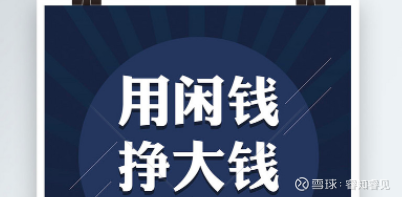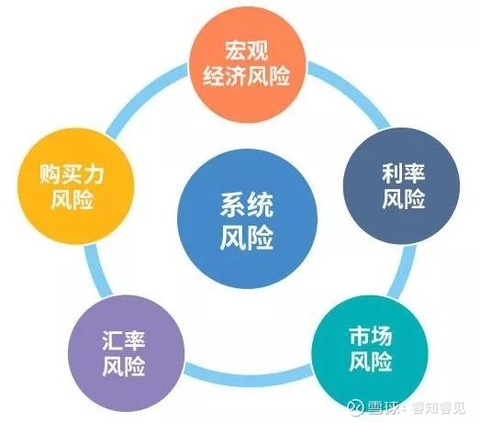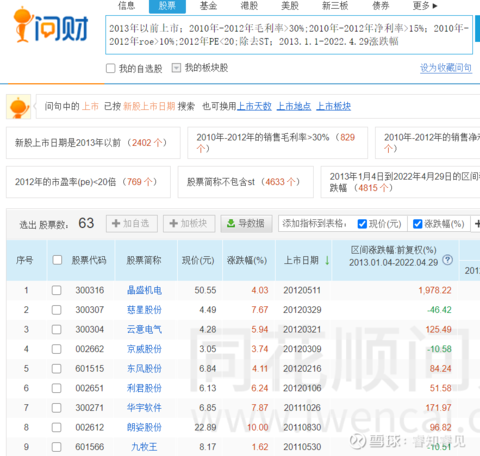There is no shortage of such investors among them, who hold a lot of stock in their hands.
I once met a netizen who was proud to say that he owns 50 stocks and is simply a fund manager!
There are more extreme people who hold more than 100 stocks and dazzle me!
If you think it’s funny to buy so many stocks, what if someone buys 100 funds?
These people buy so many stocks or funds, but they actually have a common voice in their hearts: diversify investments and reduce risks.
Most of these people are people with very little investment knowledge and experience. They believe that buying a few more at a time can spread the risk.
So the question is, who is more stupid who buys 100 stocks or 100 funds?
This question, we will discuss it later, let’s take a look at what is the reason for diversification of investment?

1. Diversification of investment is to prevent the risk of individual stocks
There are two types of risk in the stock market: market risk and individual stock risk
Individual stock risk refers to the fact that individual stocks encounter a black swan and the company’s fundamentals deteriorate, resulting in a sharp drop in stock prices. For example, Hengrui Medicine suffered from centralized procurement; Nokia suffered from Apple’s dark attack; Sanlu poisoned people; domestic clothing companies encountered competition from overseas companies; listed companies suffered financial fraud and so on.
More serious, it may lead to direct bankruptcy or delisting of the company.
It is impossible to completely avoid the risk of individual stocks, so we should not take it for granted that the stocks we buy will always rise. On the contrary, some of the stocks we buy must have plummeted, and there will be no losses to the pants.
But this kind of loss must be accepted by investors, and the only way we can reduce this kind of loss is to diversify investment.
A stock is an asset with unlimited upside and limited downside . The big deal is that it will lose money. But many stocks have risen by dozens or hundreds of times. If you catch a 100 times bull stock, your other stocks will lose all, and you can make money.
In other words, by buying a stock, individual stock risk cannot be avoided. But buy a few more, you can effectively avoid it.
Market risk refers to the overall decline of the stock market, which may be due to overvaluation, economic crisis, liquidity crisis, inflation, war and so on.
This risk is systemic and cannot be avoided no matter how dispersed it is. For example, the decline of A shares this year is a systemic risk. The vast majority of people’s investment portfolio as a whole basically can only lose money!
Although this systemic risk cannot be resolved through diversification, as long as your funds have no deadline, it will naturally rise back after a period of time.
In other words, systemic risk can be resolved with time . So in a big bear market, don’t mess around. When the entire stock market is bad, losses are normal. At this time, I was always thinking about making money, but I was courting death. What we can do is to wait, follow it down, and when it is almost down, we can use the bonds or cash we have to cover the bottom.
In addition, the occurrence of such systemic risks in the stock market is unpredictable, so the money that goes into the stock market must be spare money that will not be used for a long time. Otherwise you may lose blood!

The above is about stocks, what about funds?
If it is a broad-based index such as the CSI 300 and the ChiNext, there is no risk of individual stocks, because they are originally a basket of stocks and have been sufficiently dispersed. (Active funds do not have this risk either)
But the industry index may not necessarily be. If a certain industry is destroyed by a group, it will be cool, such as the previous education and training industry. What about medicine? Can’t say no, but it’s very unlikely, but it’s possible that future growth will be limited.
But all funds are not immune to systemic risk. For example, in this year’s decline, most funds have plummeted, and most of the previous star funds have fallen by more than 40%! It’s not as good as individual stocks.
There is also a way to defuse the systemic risk of the stock market, which is to diversify large categories of assets , such as holding stocks, bonds, cash, commodities, gold and real estate at the same time.
It rarely happens that all assets fall. If it does happen, it is estimated that it will be a world-class disaster. At that time, it is useless for you to hold cash!
For example, in this crash, if you hold bonds, you will be very happy! People like me, who have no special complex with houses, even sold one of the houses and prepared to hunt for the bottom of the stock market.
All in all, stock diversification is to prevent individual stock risks; major asset diversification is to prevent systemic risks.

2. The best number of stocks held by ordinary investors is 8-20
Holding only 1 stock, stepping on the thunder is a disaster.
How many stocks can you hold to defuse the risk of individual stocks?
There is a common sense:
If you hold 4 stocks, you can eliminate 68% of the risk of individual stocks; if you hold 8 stocks, you can eliminate 83% of the risk of individual stocks; if you hold 16 stocks, you can eliminate 91% of the risk of individual stocks; if you hold 32 stocks, you can eliminate the risk of individual stocks. 96% individual stock risk.
In other words, holding more than 8 stocks has little effect on resolving the risk of individual stocks. (Eliminate 100% of the risk of individual stocks, which means that the investment portfolio is exactly the same as the market volatility)
But a person’s energy is limited, it is impossible to understand all stocks, and there are at most 20 stocks that we can fully understand.
So the optimal number of stocks to hold for the average investor is 8-20.
If you own 30 stocks, the overall volatility is about the same as the broader market.
I randomly set some filters and picked 63 stocks. The filter criteria are:
2010-2012 gross profit margin>30%; 2010-2012 net profit margin>15%; 2010-2012 roe>10%; 2012 PE<20; then remove ST. The filter results are shown in the figure below.

If we buy these stocks on average, from 2013 to April 29, 2022, how much is the gain in 10 years?
The yield is 247%, and the annualized rate of return is 9.5%.
In this range, the income of CSI 300 is 96%, and that of GEM is 220%.
The rate of return is similar to that of the GEM. But note that this is the stock I deliberately added a filter to select. The result is not much stronger than the index.
This fully shows that for ordinary investors, it is enough to diversify into 20 stocks.
If there are too many, you won’t study each stock deeply enough, and you’ll get worse returns.
If you want to exceed the returns of the index, you must do a good job of concentrated investment, and the premise of concentrated investment is to have a deep understanding of listed companies! Otherwise, it is better to buy the index directly.
3. The trick of identifying fund managers at a glance
Some fund managers hold dozens or hundreds of stocks. When you encounter such a fund manager, you should slap him directly.
With so many holdings, it actually performs about the same as the index. To put it bluntly, he is replicating the performance of the index.
The industry evaluates fund managers based on their relative performance, that is, their returns compared to the index.
As long as their performance is close to the index, although not very eye-catching, it will not be ranked last.
But as a Christian you have to be clear. Since his performance is similar to the index, why don’t you just buy the index? Active funds have a management fee of 1.5%, while index funds only have 0.5%.
So a fund manager with concentrated investment must be good? Not necessarily!
If the manager is lucky and hits the style of the stock market at that time, concentrated investment will have a very good performance, but if he does not step in the direction, the fall will be very sour, far exceeding the average decline of the broader market.
This year’s hot topics such as new energy and semiconductors perfectly illustrate this truth.
If a fund manager insists on concentrated investment for a long time, can control the withdrawal well, and has excellent historical performance for more than ten years, we can barely say that he is a good manager.
Therefore, whether fund managers focus on investment is a double-edged sword, and it takes a pair of eyes to find out good managers.
But at least we know that over-diversified fund managers are definitely mediocre. They charge more expensive management fees, but they are replicating the performance of the index.
Sadly, China’s fund managers are becoming more mediocre and their holdings are more and more dispersed.
why?
Because the structure of A shares is changing, there are more and more institutions. So it’s getting harder and harder to beat the index. These managers then replicate the index more and more. (though they won’t say so)
This phenomenon is particularly evident in the United States, which is a highly efficient market with few retail investors. So the average position of the fund is 100-150 stocks!

4. Who is more stupid?
Who is more stupid to buy 100 stocks and 100 funds?
Both are stupid!
If they don’t sell after buying, and hold for a long time, the final income of these two kinds of people can’t even compare with the broad-based index!
But if they keep doing the bands, they will almost certainly lose money!
If you have to compare these two types of people, the person who buys 100 funds is even more stupid!
Because the handling fee and management fee of the fund are more expensive.
Spending such an expensive fee to do something like randomly buying 100 stocks in the broader market, isn’t that stupid?

V. Summary
This article mainly talks about the knowledge of diversified investment, and summarizes 7 points for everyone:
1. Stock diversification can avoid individual stock risk, but it cannot avoid systemic risk;
2. Systemic risk can be resolved through time and asset diversification, so don’t just buy stocks, but also bonds, gold and other assets;
3. Funds usually do not have individual stock risk, only systemic risk, but industry funds may encounter the industry being wiped out;
4. The best number of shares held by ordinary investors is 8-20; the best number of shares held by stock funds should not exceed 10;
5. Concentrated investments with in-depth research on fundamentals and valuations can increase returns, while over-diversified investments cannot beat the index;
6. Over-diversified fund managers are playing hooligans and defrauding the management fees of the Christian Democrats, but they are replicating the performance of the index;
7. Fund managers who focus on investing sometimes make you feel good, and sometimes make you feel like crying. It is very difficult to identify a good manager!
Reward is voluntary, 1 cent is silent support, haha!
There are 15 discussions on this topic in Snowball, click to view.
Snowball is an investor’s social network, and smart investors are here.
Click to download Snowball mobile client http://xueqiu.com/xz ]]>
This article is reproduced from: http://xueqiu.com/1843761023/219923991
This site is for inclusion only, and the copyright belongs to the original author.